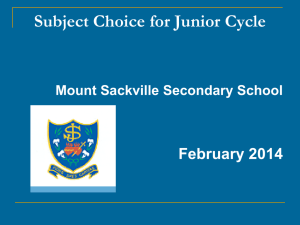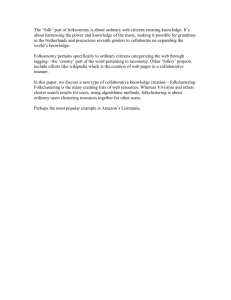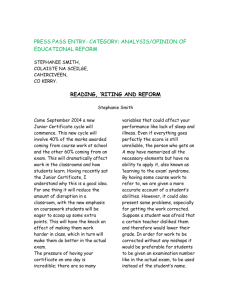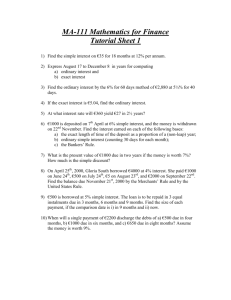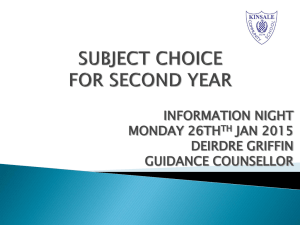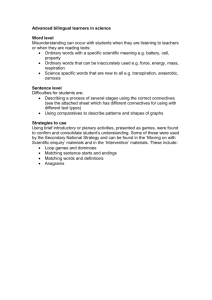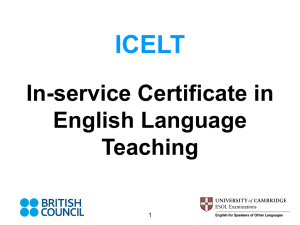accounting - East Glendalough School
advertisement
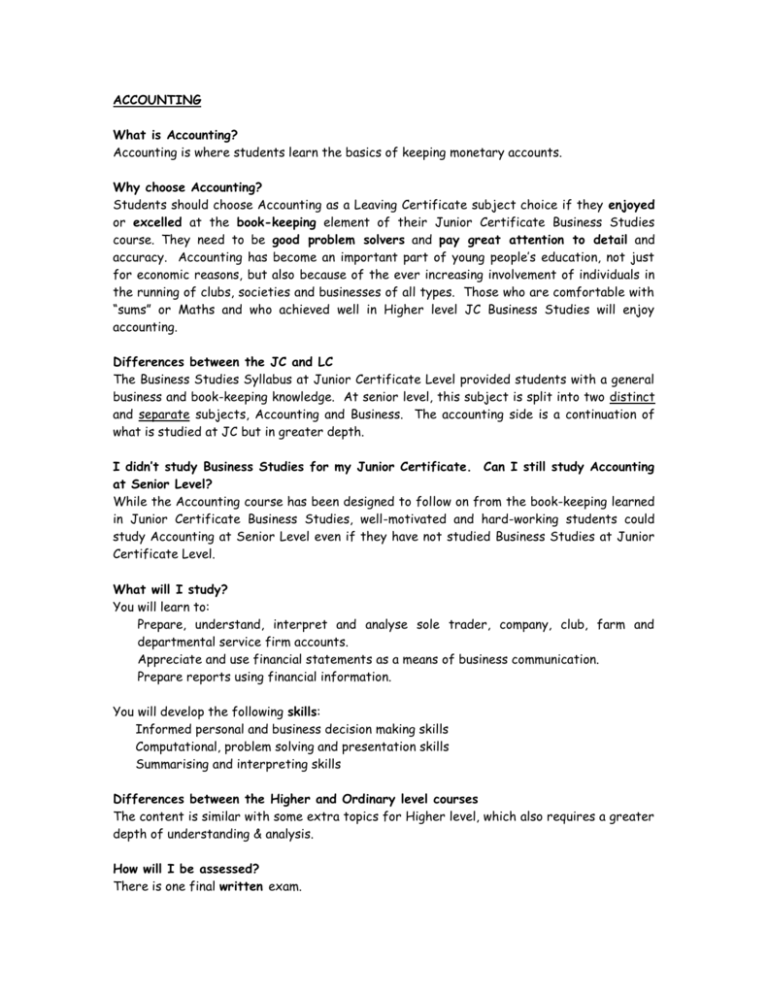
ACCOUNTING What is Accounting? Accounting is where students learn the basics of keeping monetary accounts. Why choose Accounting? Students should choose Accounting as a Leaving Certificate subject choice if they enjoyed or excelled at the book-keeping element of their Junior Certificate Business Studies course. They need to be good problem solvers and pay great attention to detail and accuracy. Accounting has become an important part of young people’s education, not just for economic reasons, but also because of the ever increasing involvement of individuals in the running of clubs, societies and businesses of all types. Those who are comfortable with “sums” or Maths and who achieved well in Higher level JC Business Studies will enjoy accounting. Differences between the JC and LC The Business Studies Syllabus at Junior Certificate Level provided students with a general business and book-keeping knowledge. At senior level, this subject is split into two distinct and separate subjects, Accounting and Business. The accounting side is a continuation of what is studied at JC but in greater depth. I didn’t study Business Studies for my Junior Certificate. Can I still study Accounting at Senior Level? While the Accounting course has been designed to follow on from the book-keeping learned in Junior Certificate Business Studies, well-motivated and hard-working students could study Accounting at Senior Level even if they have not studied Business Studies at Junior Certificate Level. What will I study? You will learn to: Prepare, understand, interpret and analyse sole trader, company, club, farm and departmental service firm accounts. Appreciate and use financial statements as a means of business communication. Prepare reports using financial information. You will develop the following skills: Informed personal and business decision making skills Computational, problem solving and presentation skills Summarising and interpreting skills Differences between the Higher and Ordinary level courses The content is similar with some extra topics for Higher level, which also requires a greater depth of understanding & analysis. How will I be assessed? There is one final written exam. Accounting is useful such careers as: Accountancy, Auctioneering, Auditing, Banking, Book-keeping, Clerical Work, Teaching, Company Secretary, Hospital Administration, Hotel Management, Receptionist, Insurance, Purchasing Officer, Quantity Surveyor, Sales Representative, Store Management, Computer Systems, Advertising, Business Law. AGRICULTURAL SCIENCE What is Agricultural Science? Agricultural Science is the study of the science and technology underlying the principles and practices of agriculture. It aims to develop knowledge, skills and attitudes concerning the factors that affect the long-term well-being of agricultural resources, and places emphasis on the managed use of these resources. Why choose Agricultural Science? Students should choose Agricultural Science if they are interested in Food, Agriculture, Animals, Crops, Nutrition and the Environment, Farming, Horticulture or Science. Agricultural Science is accepted as a Science subject at all third level colleges in Ireland, although may not meet special course requirements if a specific Science subject is required. I didn’t study Science at JC. Can I study Agricultural Science at LC? All students in East Glendalough School study Science to JC. What will I study? The course consists of the study of a variety of aspects of agriculture under the following headings: Soils The general structure and function of plants Farm crops—cereal and roots Forestry, trees and shelter Structure and function of the animal body Dairy, sheep, pig and beef Genetics Farm Buildings (for school assessment only) Grassland management Plant Science Farm machinery Differences between the Higher and Ordinary level courses The content is similar but requires a greater depth of understanding & analysis. How will I be assessed? Written examination in June Coursework 75% 25% The coursework comprises of a project and experiment book which are each worth 50% of the coursework mark. The project involves studying two animal (sheep & dairy) and two crop (potato and barley) production systems and includes a number of farm visits. The student is also required to identify and detail information on ten animals related to agriculture and ten weeds in their project folder. The other 50% of the coursework marks are given for a minimum of six experiments under the main topic headings. However to secure top marks students should endeavour to complete up to twenty-five experiments. Agricultural Science is useful such careers as: Agricultural, Engineering, Agricultural Inspector, Agricultural Officer, Agricultural Sales, Animal breeder, Animal Trainer, Botanist, Biologist, Butter-maker and Cheese-maker, Conservation, Creamery Manger, Dairy Scientist, Farmer, Farrier, Fish Farmer, Food Scientist & Food Safety Inspector, Forester, Forestry Inspector, Horticulturalist, Laboratory Technician, Seed Analyst, Technical Sales Manager, Veterinary Nurse & Surgeon, Zoologist ART What is Art? Art at Leaving Certificate is a two year course designed to allow students to develop competence in the visual arts disciplines. The syllabus is structured to combine art history, theory and appreciation with practical creative techniques and methods. Why Choose Art? A student who demonstrates an interest or ability in any aspect of Art, Craft or Design may choose the subject. Students will make art that explores different kinds of subject matter, topics and themes. Students will understand and use sensory elements, organisational principles, and expressive images to communicate their own ideas in works of art. Students will use a variety of material, processes, mediums and techniques, new and traditional, for creating and exhibiting works of art. Through the study of Art History and Appreciation students will reflect upon, interpret, and evaluate works of art, using the language of art criticism. Students will analyse the visual characteristics of the natural and built environment and explain the social, cultural, psychological and environmental dimensions of the visual arts. Differences between the JC and LC Junior Cert Art includes many of the same disciplines as Leaving Cert but the form of assessment is totally different. JC students experienced a number of art disciplines and learned a variety of art skills to improve both their competence in the physical aspect of the subject as well as attaining an appreciation for the aesthetics of each area. Junior Cert is a continually assessed project. Classwork is examined at the end of the year. Leaving Cert Art develops these skills further and new skills are introduced in all aspects of the curriculum. Students choose between still life and imaginative composition, study life drawing and choose from a range of crafts. There is more of an emphasis on Art History which makes up 37.5 % of the overall mark. I didn’t study Art at JC. Can I still study it at LC? A certain standard and proficiency in all aspects of Art, Craft and Design is required to study the subject at Leaving Cert Level. Students who don’t study Art at JC will find it hard to pick it up at LC, as skills learned in the Junior cycle will not be revised but will be developed to achieve a higher standard. What will I study? Still Life, Design, Craft, Imaginative Composition, and Art History and Appreciation. Differences between the Higher and Ordinary level courses Students sit the same practical exams and are marked on their work. In Art History Ordinary level students are expected to answer questions factually whereas Higher level are expected to analyse. For both levels, theory (Art History) amounts to 37.5% of the exam so higher level English is beneficial to students who choose Higher Level Art. Both levels require a commitment on behalf of the student to develop their skills to a high standard and to maintain a consistent level through class work and homework. How will I be assessed? Assessment Area Assessment Type Mark (400) % History and Appreciation of Art Written 150 37.5 Life Sketching Practical Exam 50 12.5 Still Life or Imaginative Composition Practical Exam 100 25.0 Design or Craft Skills Project 100 25.0 Art is useful in such careers as: Advertising, Antiques, Art Teacher, Architecture, Book Binding, Fine Artist, Crafts-person, Art Historian, Fashion Industry, Florist, Furniture Design, Gallery and Museum Work, Graphics Design, Industrial Design, Web Design, Game Programming, Merchandiser, Occupational Therapist, Primary Teacher, Picture Restorer, Printing and Publishing, Sculptor, Sign-writer, Video Production, Textile design, Upholstery, Television and Theatre, Town & Country Planning. BIOLOGY What is Biology? Biology is the science of life. It is concerned with the characteristics and behaviours of organisms, how species and individuals come into existence, and the interactions they have with each other and with their environment. Why Choose Biology? Biology is the study of life. Through the study of Biology students employ the processes of science in their investigations and explore the diversity of life and the inter-relationship between organisms and their environment. Students develop an understanding and knowledge of the unit of life the cell whose structures and processes are shared by all living organisms and, in so doing, gain an insight into the uniqueness, function and role of organisms, including themselves. In addition, they become aware of the use by humans of other living organisms and their products to enhance human health and the human environment and make informed evaluations about contemporary biological issues. It is intended that this syllabus will prove relevant to the lives of students and inspire in them an interest in and excitement about Biology. It should enable them as future citizens to discuss and make judgements on issues in Biology and Science that impact on their daily lives and on society. It should provide them with the knowledge, skills and understanding to pursue further education, training and employment in Biology-related fields. Differences between the JC and LC: The Leaving Certificate course is a continuation of what is studied in the Junior Certificate. I didn’t study Science at JC. Can I still study it at LC? All students in East Glendalough School study Science to JC. What will I study? It is divided into 4 main areas: Botany – study of plant life Zoology – study of animal life Physiology – study of functions of living creatures, including humans Ecology – study of plants and animals in their environment. A snapshot of the areas focused on in Biology include genetics, the environment, microbiology, how Biology is used in industry (e.g. Guinness), and a look at some conditions associated with the lungs, nervous system and so on. Differences between the Higher and Ordinary level courses Ordinary and Higher level Biology are divided on the basis of the material covered and the depth of detail studied. At Higher level, some topics are studied in more detail and the final exam reflects this, although much of the material is similar. You are expected to have a very good understanding of areas covered both at Higher and Ordinary level. How will I be assessed? Biology is assessed by examination only. However, the course covers at least 22 experiments which are carried out over 2 years. These are examined in the final exam and so can be prepared well in advance. Biology is useful for such careers as: Agriculture, Agricultural Research, Animal Breeder, Animal Trainer, Ambulance Driver, Audiologist, Biochemist, Biologist, Biology Teacher, Catering superintendent, Chiropodist, Conservation Work, Dental Craftsperson, Dairy Scientist, Dental Hygienist or Nurse, Dentist, Dietician, Doctor, Environmental Scientist, Farmer, Fisheries, Food Scientist, Forester, Forestry Inspector, Geneticist, Health Inspector, Horticulturalist, Microbiologist, Nurse, Pharmacist or Technician, Physiotherapist, Psychologist, Radiographer, Seed Analyst, Serological Assistant, Speech Therapist, Trout Farmer, Veterinary Surgeon or Nurse, Wild life Ranger, Zookeeper, Zoologist, Oceanographer. BUSINESS What is Business? The LC Business course is an enjoyable, informative course about the world of business and the people who are affected by how they are run. It covers business activity on a national and global basis. Why Choose Business? The LC course is based around successful businesses who treat their stakeholders (people affected by how a business is run) well. Examples include the Body Shop, Ben & Jerry’s Icecream, Virgin Atlantic. The course, through the use of case studies and examples, shows the student that successful, profitable businesses can make money by treating employees, consumers and suppliers well. “We are prone to judge success by the index of our salaries or the size of our automobiles rather than by the quality of our service and relationship to mankind” – Martin Luther King. “If you have a happy, motivated staff you can achieve anything” – Richard Branson Differences between the JC and LC Unlike “Junior Certificate Business” there is very little use of the calculator in LC Business. The course is mostly Theory and Definitions so all of the accounts, ledgers, etc. done in Junior Cert Business are covered in “Accounting” NOT in Business. There is little overlap in content between the JC and the LC. I didn’t do Business Studies at JC. Can I still study it at LC? Yes. What will I study? Unit 1 People in Business – Those people affected by how a business is run, e.g. consumers employees. How employees & consumers can deal with problems e.g. buying faulty goods, unfair dismissal. Unit 2 Entrepreneurs- The people who come up with the idea of a business e.g. Richard Branson “Virgin Atlantic” Unit 3 Management’s skills & activitiesLeadership Plan Motivation Organise Communications Control Unit 4 Human Resource Management - Changing role of management, monitoring the success of a business, insurance, tax & finance of a business. Unit 5 Identifying Business Opportunities - Getting a business started. Marketingstrategy, product, place, price, promotion. Expanding the business. Unit 6 Types of Business (e.g. Private limited Company) Economy & business, Government & Business. Setting up business in your own community. Conflict between business & society e.g. Pollution. Unit 7 - Ireland’s relationship with the world, the European Union & global businesses. Difference between Ordinary Level & Higher Level: At Ordinary level you need to know the entire course/ book and are asked for definitions, examples & points in exam. You do not have to analyse situations, problems in great detail. At Higher level questions assume that you know the course/ book so you will have to use this to analyse situations. How will I be assessed? Ordinary Level Test – 2 ½ hours ( 1 Paper) 15 short questions-answer 10 (100 marks) 8 Long Questions-answer 4 (75 marks each) 25% 75% Higher Level Test – 3 hours (1 paper) 10 short questions – answer 8 (80 marks) 20% Applied Business Question – Case study about a business or entrepreneur. You have to put in theory about a topic & relate it to case study. (80 marks) 20% 7 Long Questions – Answer 4 (60 marks each) 60% Business is useful for such careers as: Administration, Industry, Business, Accounting, Banking, Book-keeping, Clerical Work, Teacher, Barrister, Company Secretary, Hospital Administrator, Hotel Management, Insurance, Office Machine Operator, Purchasing Officer, Receptionist / Telephonist, Store Management, Typist, Stock broking, Sales, Marketing, Merchandising, Customs and Exercise, Taxation Law. CHEMISTRY What is Chemistry? - the science of matter; - the branch of the natural sciences dealing with the composition of substances and their properties and reactions. Why Choose Chemistry? It gives the learner a good understanding of the structure and behaviour of atoms (elements) the composition and properties of compounds the reactions between substances with their accompanying energy exchange the laws that unite these phenomena into a comprehensive system. For example the understanding of atomic structure can: (i) help solve crime, e.g. hit-and-run accidents or forgery; (ii) analyse the soil for fertiliser requirements; (iii) make fireworks displays colourful; (iv) produce highly efficient, more economical, more environmentally friendly, lighting; (v) monitor the environment for pollutants; (vi) discover the composition of the sun and distant galaxies; Students gain an understanding of chemical laws and theories. The inclusion of the applications of chemistry in the course emphasise the vocational aspects of the subject and enable students to see where it applies in the world of work. Practical skills are developed by the 28 mandatory student experiments, e.g.: setting up and manipulating apparatus and making measurements and observations. These experiments must be recorded by the students. Differences between the JC and LC A much deeper understanding of the behaviour of matter is expected. Mathematical calculations are an integral part of this course. I didn’t study Science at JC. Can I still study it at LC? All students in East Glendalough School study Science to JC. What will I study? The syllabus has the following components: • Pure chemistry 70% • Applications of chemistry 22.5% • Chemistry for citizens 7.5% The core includes: • Periodic Table and Atomic Structure • Chemical Bonding • Stoichiometry and Formulas and Equations • Acids and Bases • Volumetric Analysis • Thermochemistry • Organic Chemistry • Rates of Reaction • Chemical Equilibrium • Water Chemistry. Option 1A is additional Industrial Chemistry; (It is recommended that students taking option 1A should visit a local chemical industry.) Option 1B is Atmospheric Chemistry; Option 2A is Materials, Option 2B is Extraction of Metals and additional Electrochemistry. Differences between the Higher and Ordinary level courses Higher and Ordinary levels differ on the basis of the depth of detail studied. How will I be assessed? There is a 3 hour exam of 8 Questions, at the end of 6 th Year This exam consists of 2 sections: Section A: All questions are based on the 28 mandatory experiments carried out throughout 5th and 6th Year Section B: Long Questions based on theory and practical. Chemistry is useful for such careers as: Agriculture, Archaeologist, Architect, Brewing Technologist, Chemist, Chemistry Teacher, Dairy Scientist, Dental Craftsperson, Dental Hygienist, Dental Surgery Assistant, Dentist, Dietician, Doctor, Engineering, Especially Chemical Engineering, Food Science Technologist, Forestry Inspector, Fuel Technologist, Health Inspector, Industrial Chemist, Laboratory Assistant, Medicine, Medical Laboratory, Pharmacist, Pharmacy Technician, Physiotherapist, Pilot, Radiographer, Seed Analyst, Serological Assistant, Speech Cosmetic Science, Glass Technology, Quality control and Biotechnology, Veterinary Surgeon or Nurse. (For those careers in bold - Chemistry is mandatory in some colleges/universities). DESIGN AND COMMUNICATION GRAPHICS What is Design and Communication Graphics? Design and Communication Graphics is the LC equivalent of Technical Graphics. This course makes a contribution to the student’s cognitive and practical skills development. These skills include graphicacy/graphic communication, creative problem solving, spatial abilities/visualisation, design capabilities, computer graphics and CAD modelling. The creative and decision-making capabilities of students in the activities associated with design are developed through three principal areas of study: design and communication graphics, plane and descriptive geometries and applied graphics. This programme is designed keep up with current developments. It is intended to develop the creative thinking and problem solving abilities of students. Why Choose Design & Communication Graphics? Design & Communication Graphics is a natural follow on subject from Technical Graphics. The course traditionally included instrument drawing but now also encompasses Information and Computer Technology(ICT) skills, 3D modelling using Solidworks and Sketching skills. It also compliments other subjects such as Engineering and Construction Studies. Differences between the JC and LC Like all subjects at LC level Design and Communication Graphics is more difficult than its Junior Cert equivalent. The Ordinary level LC course is broadly similar to the junior cert higher level course. The higher level course contains many new topics, and some familiar topics from the junior cert higher level course. I didn’t study design and communication graphics at JC. Can I still study it at LC? In an ideal world, students wishing to complete Design & Communication Graphics would have completed Technical Graphics at JC level. However well-motivated and hard-working students could study DCG at Senior Level. How will I be assessed? The subject is assessed in two areas: A terminal 3 hours instrument exam in the LC A student Assignment, which is a study of an object, this consists of a portfolio which includes 3D computer modelling , ICT and sketching skills . This assignment starts in October and finishes in February of 6th year. 60% 40% What will I study? Differences between the Higher and Ordinary level courses The main difference between the Higher and Ordinary level course is the level of difficulty you are expected to study. Naturally the Higher level course covers topics in more detail than the Ordinary level course Design & Communication Graphics is useful for such careers as: All Engineering and Engineering Technician careers, Aircraft Technician, Architecture and Architectural Technologist, Army and Air Corps Apprenticeship, Cartographer, Construction Trades, Bricklayer, Carpenter, Fitter, Toolmaker, Industrial Designer, Maintenance and Service Personnel, Motor Mechanic, Technical Sales, Computer Aided Design (CAD) and Computer Aided Manufacture (CAM) Technicians, Structural Design, Printing, Town Planner, Draughtsperson, Industrial Engineer. ENGINEERING What is Engineering? This course represents a study of a wide range of mechanical engineering materials, processes and technological applications. Students develop and acquire the manipulative skills and techniques necessary for practical resourcefulness, creativity and design realisation in the execution of work. It aims to promote an educational knowledge of the materials; and understanding of the processes; ability in safely using the skills and equipment to achieve objectives through practical work; initiative in the planning and development of technological projects. A strong emphasis is place on problem solving, on research and on the design and manufacture of artefacts. Within this framework, skill in decision making is also developed. Why choose Engineering? A student who enjoys both the theory and practical side of machines, tools and project work will enjoy Engineering. Differences between the JC and LC Engineering is a continuation of the Metalwork course at JC level. Students further develop their knowledge and skills and are also introduced to a wide variety of new technologies. I didn’t study Metalwork at JC. Can I still study Engineering at LC? Yes. You will need to be self-motivated and work hard at the theoretical and practical elements of the course. What will I study? 1. Workshop Processes (Practical) Health & Safety Fabrication and Finishing of Metals Benchwork Heat Treatment of Metals Machining Plastics Processing Technology Project Design & Manufacture Electronics 2. Materials and Technology (Theory) Health And Safety Classification And Origin Of Metals Structure Of Metals Non-Ferrous Metals Heat Treatment Of Metals Corrosion Of Metals Materials Testing Plastics Joining Of Materials Machining Metrology Manufacturing Processes Technology Differences between Higher and Ordinary level courses The topics above apply equally to Ordinary and Higher level. In general terms, the syllabus at Ordinary level consists of clearly defined content aimed at providing an overview of engineering technology and its applications. At Higher level, a more analytical, qualitative and qualitative treatment of topics is required. How will I be assessed? Theory: There is a theory paper in June. Project: The student has approximately 14 weeks to design and make a model to a given design brief set by the Department of Education. Practical: The student has to make an accuracy exercise in a 6 hour exam to a drawing issued by the Department of Education. Engineering is useful for such careers as: Mechanics, Aircraft Technician, Army/Air Corps Apprenticeships, Do-it-Yourself, Engineering workshop Teacher, Fitter, Industrial Operatives, Mechanical Production, Structural and Civil Engineer and Technician, Metallurgy, Motor Mechanic, Service and Maintenance Personnel, Technical Sales, Toolmaker, Turner, Welder, Engraving, Industrial Design. FRENCH What is French? French is the foreign language studied to Leaving Certificate in East Glendalough School. A third language is needed for some University courses. Why Choose French? French at Leaving Cert level is exciting as there is more emphasis on the spoken language. Choosing French widens opportunities of travel and as France is an EU member your business opportunities are greater with French. A Third language is an entry requirement for many courses in the NUI Universities of Maynooth, Galway, Cork and UCD. Differences between the JC and LC The French course is a continuation of the Junior Certificate Course to a more advanced level. There is a higher content of personal writing in the written paper at Leaving Certificate Level. There is much more emphasis on Oral skills for the Leaving Certificate. I didn’t study French at JC. Can I still study it at LC? French would be extremely difficult to take up as a new subject in 5th year if it was not taken at Junior Cert Level. What will I study? The course content extends beyond the self and the family to society and the world. Students at both levels are expected to express their opinion on everyday topics in oral and written form. Students will practise 4 main skills in the target language – Oral, Aural, Reading and Writing. Differences between the Higher and Ordinary level courses Reading Comprehension work is a big part of both Higher and Ordinary Level Courses. Written work on the ordinary level exam consists of letter-writing, postcards, messages and close-tests. Written work on the higher level exam consists of Letter writing, Diary entrance, Essay and Creative writing. How will I be assessed? An Oral exam takes place in April. A Written and Aural exam takes place in June. Higher Oral 25% Aural 20% Written 55% Ordinary Oral 20% Aural 25% Written 55% French is useful for such careers as: Interpreter Translator Travel Agent Tourism Teacher Hotel Manager Receptionist Marketing Export Careers Sales Chef GEOGRAPHY What is Geography? Geography is not just about maps and places. Senior Geography studies global patterns and processes and how humans interact with the earth. We look at the following geographic areas: Physical e.g. earthquakes, volcanoes, rives, coasts and glaciations. Human e.g. population change, movement and settlement. Economic e.g. farming, forestry, manufacturing, tourism, development. Skills e.g. interpretation of maps and photos, graphing, sketching, statistics. A wide range of issues are studied in each topic, which we hope will lead to a greater appreciation of the world around us and the interdependence of both the physical and human environment. Why choose Geography? Leaving Cert Geography compliments other Leaving Certificate subjects such as English, Maths, Business, Biology, and History. It helps develop students’ analytical skills and also their awareness of the world in which we live. Geography students develop study and research skills which they can employ in further study and the world of work. The Geographic study is worth 20% of marks, offers students the chance to have some hands on experience, develop a range of skills and get out of the classroom. Leaving Certificate Geography is also an accessible subject for most students and builds on the work carried out in JC. What are the differences between Junior and Leaving Certificate Geography? Leaving Certificate Geography is not a continuation of the JC course but a more in-depth study of the topics and skills covered in the Junior cycle. Most of the topics and skills will be familiar to current students of geography. Students will revise these skills/topics and learn to present them is an alternate manner. I didn’t study Geography at Junior Cert. Can I still study it at Leaving Cert? All students in East Glendalough School study Geography at JC. What will I study? The Leaving Certificate Geography course is divided into different sections. The course has three Core Units that must be studied by all students. Core Unit One – Physical Geography Plate tectonics and the formation of the earth; Volcanoes and earthquakes; The rock cycle; Mountains and landforms; River features; Coastal features; Glacial features. Core Unit Two – Regional Geography Types of regions; Irish Regions e.g. The Greater Dublin Region; European Regions e.g. The Paris Basin; The EU and EU expansion; Non-European Regions e.g. India or Brazil. Core Unit Three – Geographic Investigation and Skills Interpretation of maps, photos, and satellite images; Weather map interpretation; drawing maps and sketching; River study; Study of traffic management; Study of population change. There are two Elective Units, only one of which must be studied by all students. Economic Processes Development; Employment patterns; Patterns in industry e.g. farming, manufacturing Or Human Processes Population change; Population movement; Settlement patterns. Students who opt to study Higher Level must study one of the following areas: Global Inter Dependence Geoecology (Soils and Rain Forests or Deserts) Culture and Identity The Atmosphere/Ocean Environment How will I be assessed? The Leaving Certificate Examination is divided into two parts A Geographic Study e.g. River processes This is worth 20% of the total exam and is submitted in April of the exam year. The Leaving Certificate Exam itself – worth 80% of the marks. Higher Level and Ordinary Level get a separate exam. The exam paper is divided into sections which cover the topics mentioned above. The first question on the exam paper is made up of a series of short answer questions. The remainder of the exam consists of longer answer questions. Geography is useful for such careers as: Civil Engineering, Construction, Urban and Regional Planning, Architecture, Meteorology, Climatology, Surveying, Mineralogy, Agriculture, Horticulture, Auctioneering, Forestry, Conservation work, Market Research, Statistical Analysis, Archaeology, Air Traffic Control, Anthropology, Cartography, Development Work, Geology, Teacher, Tourist Officer, International Driver, Naval Deck Cadet, Army Cadet, Pilot, Quantity Surveyor, Civil Service. HISTORY What is History? When we undertake to study history we are dealing with the experiences of human life in the past. Our study involves an investigation of evidence which has survived to this day in relation to events and individuals of the past. Students will become familiar with human experiences which are often very different to his/her own. The student of history will gain an insight into other ways of life and thinking. By coming into contact with past experiences the student will gain a valuable insight into the roots of his/her own identity as well as the traditions he/she has inherited. Why Choose History? By studying History the student will come to appreciate how the world and its people have evolved over the course of centuries. The syllabus allows the student to engage in an exploration of what historians believe happened over the course of time, and this exploration is based on the evidence available to us today. Therefore, the student will involve himself/herself in the study of a number of historical topics relating to Ireland, Europe and the wider world from the early nineteenth century to almost the present day. The syllabus places a great emphasis on developing certain skills which are particular to the work of the historian, for example, working with evidence and researching. The student will also learn the art of working with documents allowing him/her to develop an expertise in the evaluation of evidence. As a result the student can expect to develop a capacity to make reasoned judgements on our historical past. Differences between the JC and LC The content of the Junior Certificate syllabus is focused on very different aspects of history and is far removed from the content of the Leaving Certificate syllabus. What will I study? The History Department follows the Later Modern, 1815-1993, course of study and the syllabus comprises of two inter-linking parts as follows: WORKING WITH EVIDENCE Here there will be an introduction to history and the work of historians. This will form the basis of the students future work on topics for examination as well as the document based study and the research study. The student will engage in a document–based study of one of the syllabus topics as a means of developing the skill of working with evidence. The student will also undertake a research study of a significant historical subject or individual as a means of developing further his/her skills in working with evidence, and also as a means of developing his/her research skills. TOPICS Four sections are studied, two in Irish History and two in Modern European. In 2010/2011, two options from the Later Modern Ireland will be studied. These may include (for example) Partition and Sovereignty in Ireland 1912-49 Government, economy and society in the Republic of Ireland, 1949-89 In addition two options from the Later Modern Europe section will be studied. One will be ‘European retreat from empire, 1945-1990’, which is the Compulsory Documents section. The other section may be (for example) ‘Dictatorship & Democracy, 1920-45’ or ‘the U.S. & the World, 1945-89’. In summation, there are five sections: Special Research Study Later Modern Ireland Option One Later Modern Ireland Option Two Later Modern Europe: Option One Later Modern Europe: Compulsory Documents Section ‘European retreat from empire, 1945-1990’. Options B,C & D are at the teacher’s discretion. For a full list of options please check the Resource Finder at www.hist.ie Differences between the Higher and Ordinary level courses Both levels cover the same material. The Higher level requires the student to present answers in the form of analytical essays which show a detailed knowledge of the topic. The Ordinary Level students will be required to present answers in the form of shorter less analytical essays and paragraphs. How will I be assessed? 20% of the marks go for the Research Study which is submitted in April of 6 th Year. The Final Examination accounts for the remaining 80%. History is useful for such careers as: Politics, Journalism, Local Government Social Work, Sociology, Archaeology, Barrister, Civil Service, Guide, History Teacher, Law Clerk, Museum Work, researcher, Solicitor, Trade Union Official, Prison Service, Probation Officer, Garda, Tourism, Writer, Broadcaster, Librarianship, Genealogy. HOME ECONOMICS (SOCIAL & SCIENTIFIC) What is Home Economics? Home Economics is a multi-disciplinary subject combining theory and practice in order to develop understanding and solve problems. It is concerned with the way individuals and families manage their resources to meet physical, emotional, intellectual, social and economic needs. Why Choose Home Economics? Because of its diversity, Home Economics is of interest to a wide variety of students. The range of careers that are linked to Home Economics is vast, so it is beneficial to many students. Differences between JC and LC? The LC course is a continuation on from JC. However motivated and hard working students may take up the subject in Senior cycle. I didn’t study Home Economics at JC. Can I still study it at LC? As the course is a continuation it is recommended that students have studied Home Economics at JC. However, well motivated and hard-working students could study Home Economics at Leaving Certificate. What will I study? Food Studies Resource Management and Consumer Studies Social Studies 45% 25% 30% Differences between the Higher and Ordinary level courses The course material is for the most part common but there is some material which is required to be studied at Higher level only. Higher level students will be required to have a more in-depth knowledge of topics and to show a greater degree of practical and procedural skills. How will I be assessed? 20% - Coursework 80% - Final Written Examination. Coursework The Department of Education issues students with six assignments in September of 5th Year. Five of the six assignments must be completed by all students. The assignments involve research into different areas of the Food Studies course. The research undertaken by students is presented in a journal which is submitted in November of 6th Year. Students will take part in five cookery practicals as part of their research. Absence on the day of these practical classes will result in students losing valuable marks. NOTE: As a key part of the course is carried out in 5th Year (as detailed above) it is important that any student opting for home economics must be prepared to work from the beginning of 5th Year to maximise their grade in this subject. Home Economics is useful for such careers as: Baking and Confectionary, Butchers, Catering, Chef, Cheesemakers, Child Care, Consumer Adviser, Demonstrator – food, wines, etc. Dietician, Environmental Designer, Environmental Health Officer, Home Management, Home Economics Teacher, Hotel Manager, Institutional Management, Managers, Technologists & Technicians in the Food Industry, Nursing, Occupational Therapist, Parenthood, Qualify Controllers, Social Worker, Waitress, Sales, Solicitor, Trade Union Official. MUSIC What is Music? Music, from earliest times, has been an important expression of human creativity. Today it is a valued social and cultural art form that transcends language and religious and racial barriers. Why study Music? Music is an education for life. By sharing musical activities it helps develop personality skills and cooperative effort. Music provides a creative outlet, helps in employment opportunities and plays an important role in the social fabric of our society. Students who enjoy music and wish to develop and stretch their musical knowledge and skills will like this course. Since the new Syllabus was introduced in 1999 many more students have opted for Music at LC. Good exam results are now within reach of more students. In a recent Chief Examiner's Report: 17.8% of students achieved an A1 or A2 grade at Higher level 74.1% achieved a B3 grade or higher 97.5% of students achieved honours (C3 grade or higher) and there was only a 0.1% failure rate. Differences between JC and LC Music at LC is a continuation of the course at JC. It follows the same activities but with a greater level of choice to suit the individual student. I didn’t study Music at JC. Can I still study it at LC? It is possible to take up Music at LC, not having studied it at JC. However, such students would usually have a lot of involvement in Music outside of school. Skills from JC would have to be caught up on. What will I study? The syllabus is structured into three Essential Activities: Listening Students are required to analyse four prescribed works under such headings as historical context, style, form, texture, instrumental and compositional techniques (as well as production techniques, in the case of 'Bohemian Rhapsody' and the Sergeant Pepper album). They also learn how to compare and contrast music from different periods and musical styles. In addition, they learn to identify and describe the variety of styles and contexts of Irish traditional music today. Aural awareness (e.g., identification of instruments, as well as melody, rhythm and harmonic cadences) is taught in the context of the prescribed works as well as other instrumental and vocal/choral works. Students presenting a Higher Level Elective in Listening choose a special topic from an area of musical study. Five pieces are selected by the student, and a tape of ten extracts from these pieces is prepared in advance of the June exam. Composing The art of melody writing is taught both in the context of word-setting and as a continuation of a given phrase. Students are taught the rudiments of harmony and counterpoint in a variety of styles and contexts as the foundation for exam-type questions. As points of reference, composers and songwriters from Bach and Mozart to the Beatles are used, enabling students to compose using both guitar chords and more traditional forms of notation. In addition to the core components, the Higher Level Elective in Composing requires the presentation of two short pieces or songs, in any style or genre. These are composed, arranged or orchestrated by the student and notated using conventional and/or graphic notation, together with a full written description. Performing Music for performance may be chosen from classical art music, traditional Irish, ethnic, folk, rock, jazz, stage musical or other modern popular repertoires. The music chosen must show diversity in style and technique. This is the option that the majority of students choose to allocate 50% of their marks to. The Performing Activity also includes one ‘unprepared test’ from a choice of sight reading/singing or melodic/rhythmic repetition. The syllabus also allows students, at both Ordinary and Higher level, to demonstrate as part or the entire Performing requirement ‘an ability to understand and to use micro-technology music-making systems using a computer program to compose their own music. Performing requirements vary for each student: three or four pieces, depending on one or two activities. Students taking a Higher Level Elective in Performing are required to perform either six or eight pieces, a further expansion of the Core Performing activity. Differences between Higher and Ordinary level courses The Higher level includes Ordinary level requirements but Higher students need a greater depth of knowledge, understanding and skill. There is an additional Elective for Higher Level. How will I be assessed? Listening, Performing and Composing activities are assessed by means of three categories of examination – aural, written, and practical. (The practical exam takes place in March/April of the exam year.) At both Higher and Ordinary levels, each activity is allocated a 25% weighting in the exam. At Ordinary level, students choose one of the three activities to represent 50%. Students at Higher level undertake additional studies – a Higher Elective – in one of the activities to represent 50%. This allows both Ordinary and Higher level students to gain up to 50% of their total marks in the activity that best suits their interests and abilities. Music is useful for careers in: Education Music or Occupational Therapy Performance Speech and Language Therapy Production Theatrical Agent Sound Engineering Composer/ Arranger Music research positions at regional and national institutions Music business careers in retail, recording and artistic promotion Entertainment – groups, orchestra, bands, Disc Jockey, Dancer. PHYSICS What is Physics? An explanation of how the world works using physical theory and mathematical fact. Why choose Physics? Choose physics if you are interested in how things work in the physical world. Are you the sort of person who notices things around them and wonders why they happen? Difference between JC and LC? LC Physics covers most of the same topics as JC, but with more depth and more maths. You don’t have to be doing higher maths to do physics, but a basic mathematical ability is required. What will I study? The Sections to be covered: Light Waves & sound Heat Mechanics Electricity Magnetism Nuclear Physics / Radioactivity Particle Physics (higher level only) Mandatory experiments - 24 in Higher Level - 22 in Ordinary Level Done weekly in small groups on a rotational basis. Differences between Higher level and Ordinary level The courses are basically the same, with some parts for higher level only (e.g. derivations). Ordinary level questions are, of course, easier! Higher & ordinary levels are taught together in the one class. How will I be assessed? There is one paper in the LC: Section A = 30%; Section B = 70% Section A: Mandatory experiments – answer 3 questions from 4 Section B Answer any 5 long questions from 8 The long questions in section B will include: Definitions Knowledge Sums! Physics is necessary for courses in: Theoretical Physics in TCD and UCD. It fulfils the Laboratory Science subject requirement for many courses in the broad field of Science. Physics is also useful for careers in: Architecture, Astronomy, Bio-physicist, Computers, Doctor, Engineer - especially electrical and electronics at all levels, Geophysicist, Health Inspector, Marine Radio Operator, Medical Laboratory Technician, Metallurgist, Meteorologist, Naval Services, Nurse, Oceanographer, Optician, Patent Worker, Pharmacist, Physicist, Laboratory Technician, Pilot, Radiographer, Telecommunications, Apprenticeships, Scientific research, Heating and Ventilation technicians, Sound Engineer, and pure Maths courses. Notes East Glendalough School Subject Choice Evening
